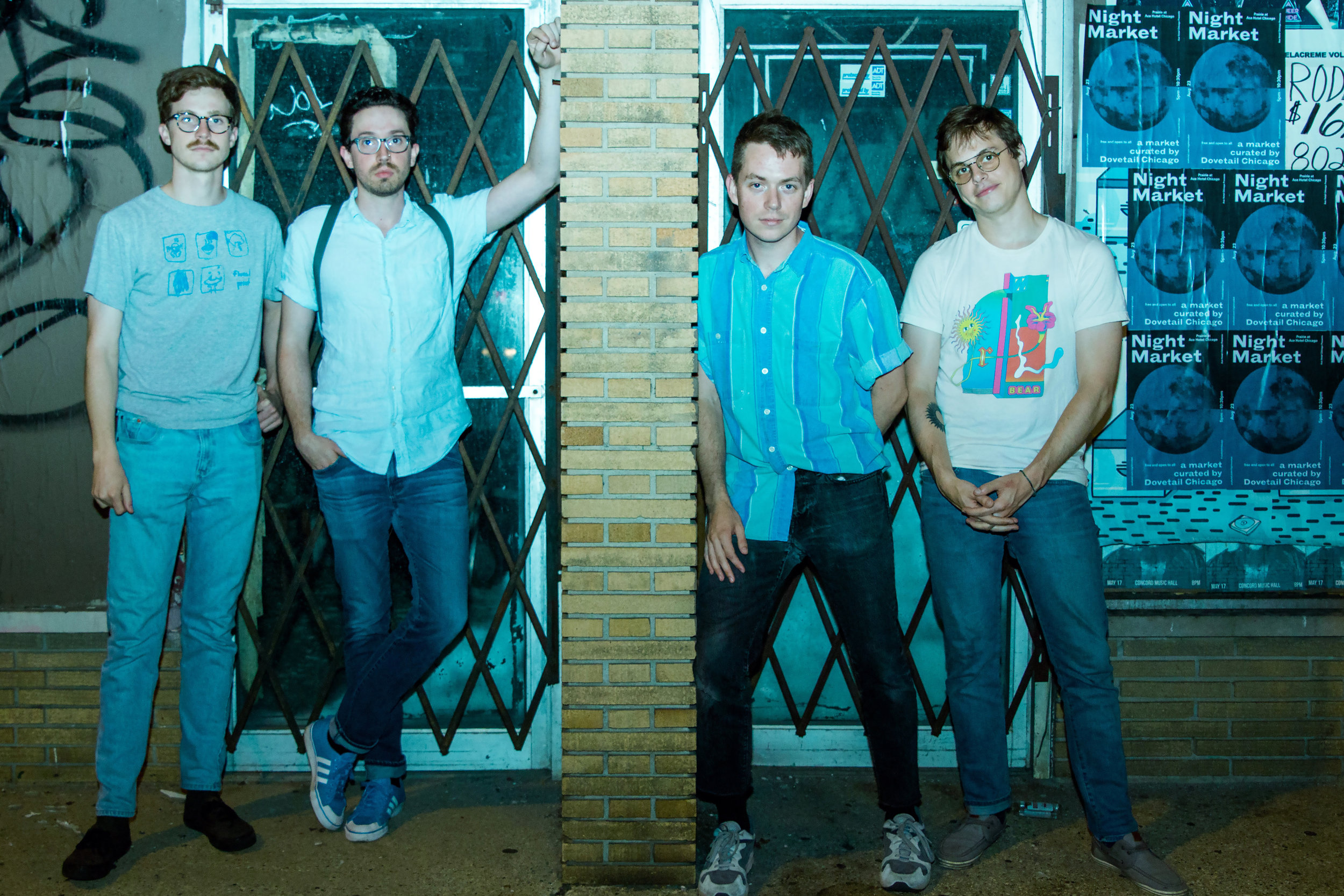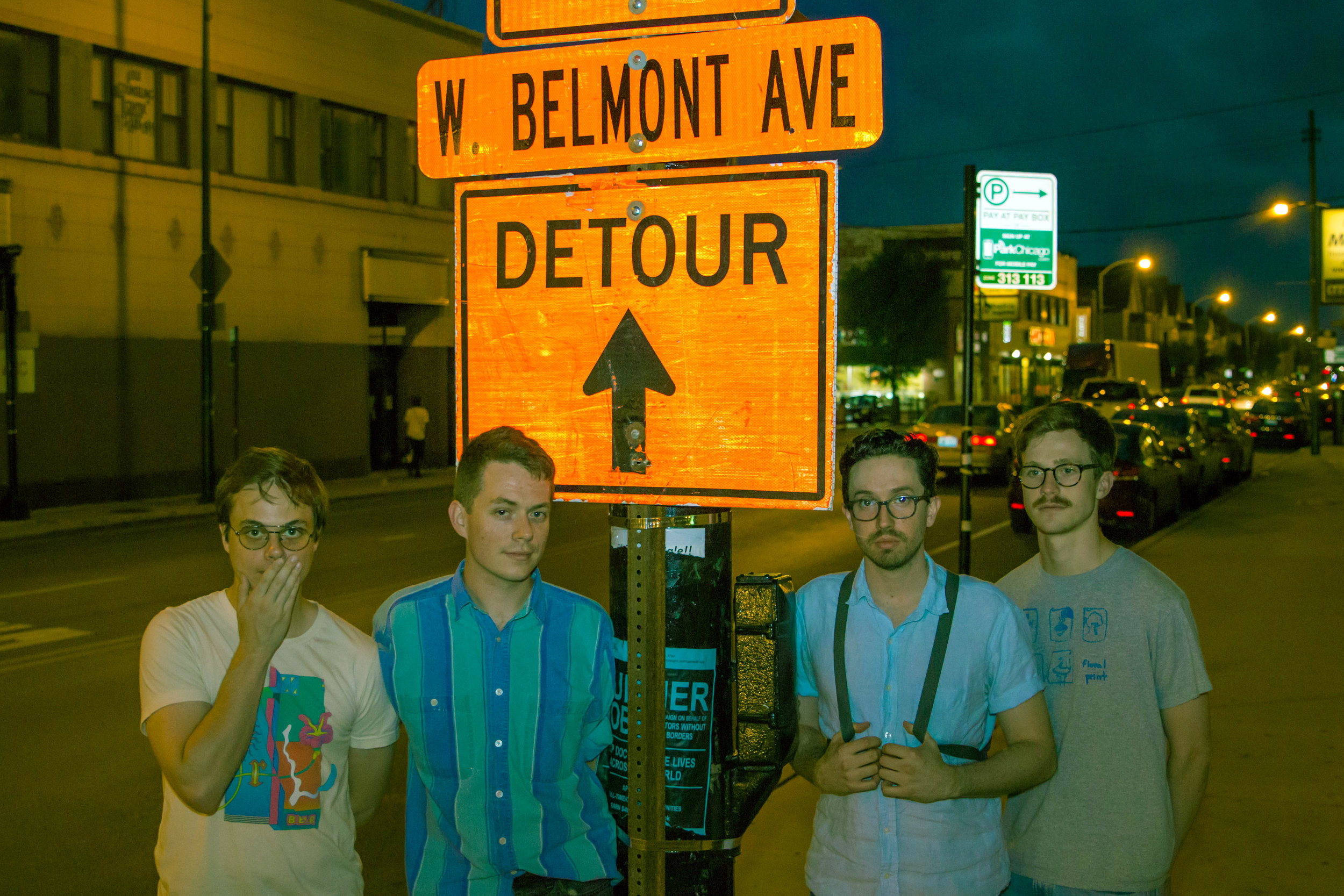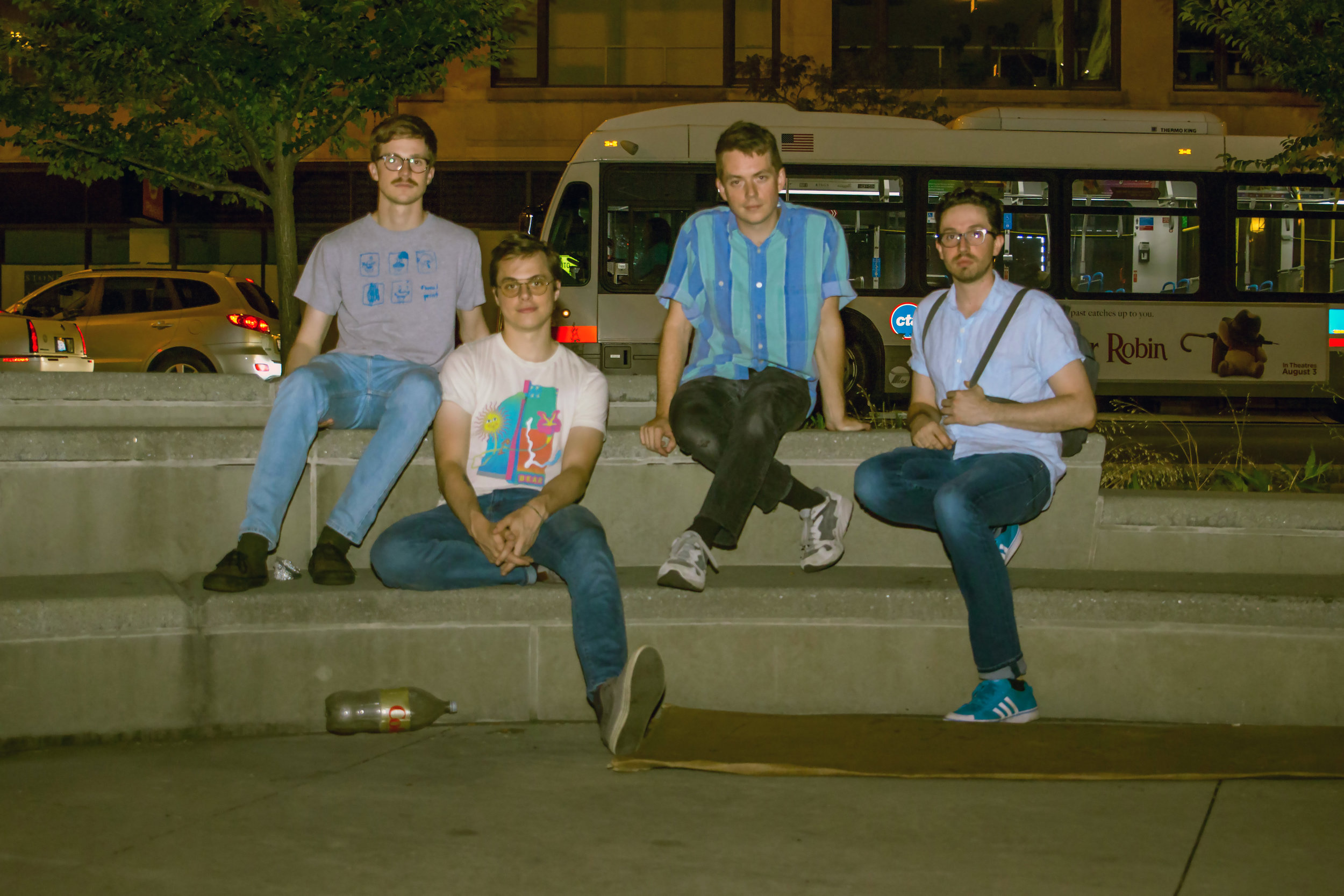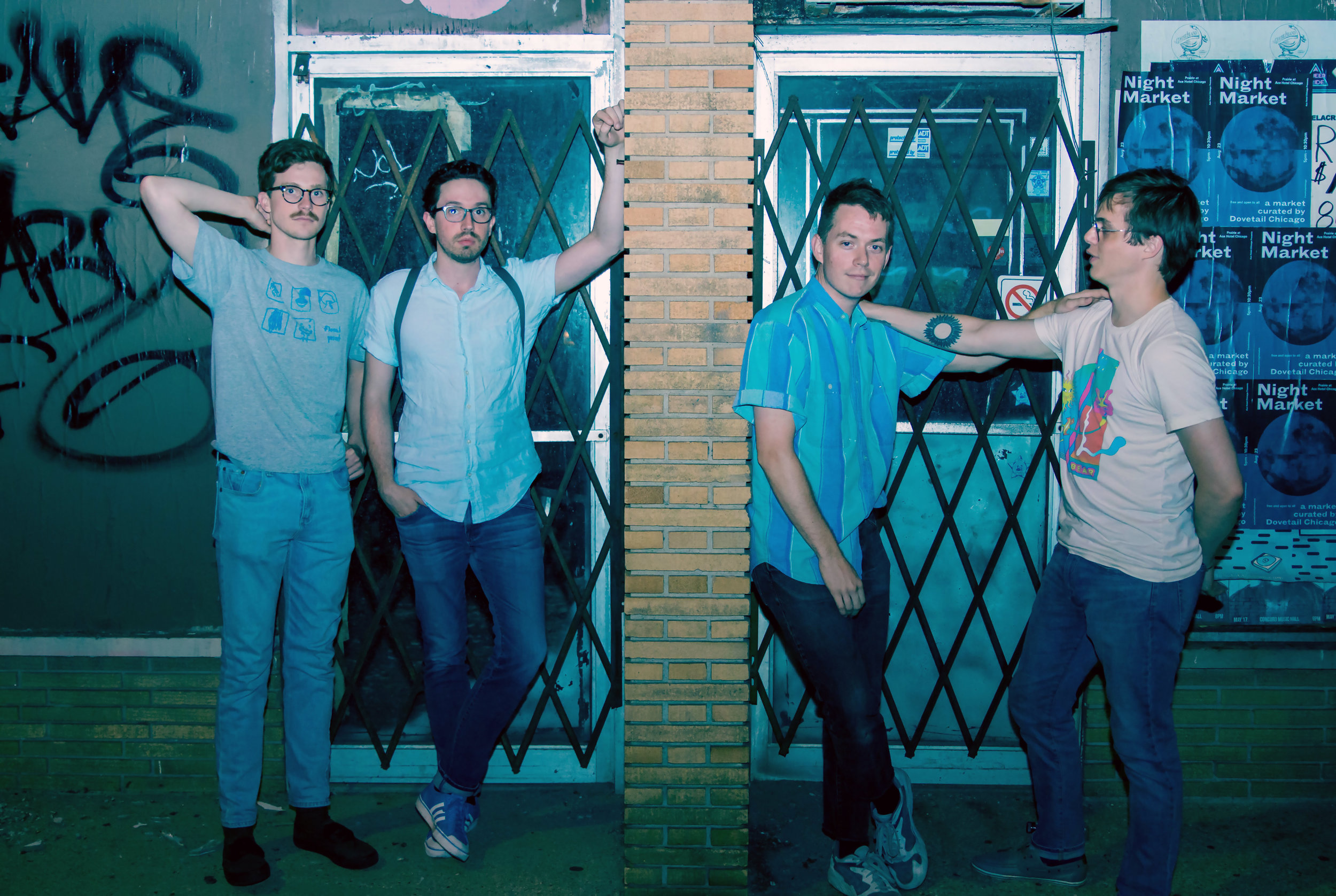A Chat With: Stuyedeyed
With just one EP under their belt, Brooklyn’s Stuyedeyed has already made their message crystal clear; They’re not just here to make great music, they’re here to do it with intention and a strong sense of conviction. They’re here to use their voices and their platform along with their music to try to bring change to a society littered with systemic issues.
During the band’s Saturday afternoon set at Audiotree Music Festival back in September, they used their time onstage to talk about important issues. “Black lives matter,” lead singer Nelson Hernandez-Espinal addressed the crowd, also asking the audience to look out for each other at the start of their set, making it clear they wouldn’t tolerate anyone violating the safe space of the festival. Their song “Mr. Policeman” from 2017’s Funeral EP details the band’s stance on police brutality and misconduct, and when speaking with the group after their show, they say the brutal honesty in their music won’t be disappearing on their next projects. In their upcoming EP and eventual full length album, Stuyedeyed will continue to address the uncomfortable in order to find growth and change, and they say they aren’t afraid to start introspectively. Tune into our chat with the full band below to hear what else they have to say about using their platform for good, the TV show Sábado Gigante, Ozzfest, and more!
Stuyedeyed is Nelson, Humberto (Bert) Genao, George Ramirez , and Luis Ruelas
What were each of your first musical memories?
Nelson: My first musical memory is my cousin came home stoned one day and he was just blasting records, and he played “Whole Lotta Love” followed by “War Pigs.”
Luis: I guess my first musical memory was finding Pantera “Cowboys from Hell” on tape in my garage. It was my brother’s tape. I found a tape player and put it on, and I was like woah, this music! Yeah that was it.
Nelson: It’s all finding everything by accident you know?
George: I grew up with my parents watching this show Sábado Gigante. It was like this television variety show that was going on for a hella long time, hosted by a guy named Don Francisco and they would have like performers sing and do an audition. I was always impressed by the music, but what I loved the most was that for people who didn’t make the cut and got heckled the most, there was a guy named El Chacal, who was this like executioner who played a trumpet and he’d go [imitates horn] and yell “FUERA!” Then a lion would come out from behind the curtain—
Nelson: Out of context this is fucking ridiculous, but you have to go home and watch. Sábado Gigante…Saturday Giant.
Bert: I think my earliest memory of music was me finding a tape...like a James Brown tape where he goes and shows us how to dance. There’s a Youtube of it. When I was three, four years old, there’s an embarrassing video of me as a child dancing to James Brown and I just started playing around with drums. Then I picked up the snare as a kid at 8 years old. I never really developed much around that but then I picked up stringed instruments that derived from that genre, like James Brown, Marvin Gaye. I was living in Brazil at the time so like that music was just carrying through. If you think about American media, it has so much output. It has so much influence in other media. The Brazilian media caught on to a lot of the soul, Africana, you know all of that memorabilia. Marvin Gaye, Black Sabbath...etc...hence why you have all these different varieties of music that are parallel. So we were getting the James Brown, Marvin Gay when I was growing up, in a sense that I remember that was my first discovery.
You recently posted about having some days off and working on the new record. How far are you in that process?
Nelson: I think what we’re doing is...we got back from tour and we actually recorded most of our full length LP. What we recorded this past time was just a short EP, four songs. But we got back from a four month run, and we were like man, we’re saying something with like “Funeral” and “Believer,” the shit that we have put out, and then with the LP we’re saying something, so there needed to be something that bridged the gap. So the name for the whole thing is called “Moments of Terribleness” and it’s like, four less-than-two-and-a-half-minute long songs. Like Jesus Lizard kind of chilled out, like one-two-three-four just like a punk band.
Bert: The way that I like to attribute it, is the songs come about in a very unique way. All songs come about differently.
They all have their own journey?
Bert: Yeah, and these songs specifically, Nelson has been formulating, layering dynamic for the songs and themes. The lyrics. The theme essentially. But the way that we all perceive it is very important, and I think that at the end of the day, you know like the moments of terribleness are the things that we need to start hearing nowadays. It’s so easy to do the things that are safe, but it’s so hard to look introspectively. Whether you want it to be or not, we’re in a position where we have a platform now, and we’re gonna speak about it. And the things that need to be talked about. Like you’re in media, you understand how it’s very hard to feel as a woman to have your voice heard. We’re gonna speak about you in a song.
Thanks, guys! I appreciate that!
Bert: We’re gonna speak about moments of terribleness. Like oh fuck, I’m a woman and I have to stand in line now because some dude wants to take pictures. Like no! You need to have that moment of terribleness so that you can understand that all of this, the conversation needs to move forward.
Nelson: The biggest theme in the record I think is pretty much just like we’re all a Latino band. We grew up having been taught sort of “machismo.” Like thematically the record really explores like me tearing myself down. The opening lyrics to one of the songs is “I need to cut off my hair because I need to stop pretending.” Just doing that kind of shit...it’s a very introspective punk piece. But we’re just like saying--
Luis: It’s very much so a very raw, minimalistic version of ourselves where we’re trying to express ourselves in a way that this is us, stop being a fucking asshole. We’re all fucking people. We’re all in this together. We just want something to shove in people’s faces and be like yo, stop being an asshole.
Bert: The most important thing is like I said, it’s very hard to look introspectively. So writing these songs and experiencing the music naturally kind of gives you like a mirror to look at yourself. Like there’s a saying that’s like don’t judge unless you’re ready to be judged yourself. So in that sense it’s like writing these songs and saying society is fucking shit, we look at ourselves like oh my gosh, I’ve been shit so many times you know. Deconstruct it. Deconstructing every single thing that has caused pain, and working backwards. Like literally whatever it is that does it, that’s what applies.
Nelson: The songs speak for themselves. Like Bert’s not sitting there on the mic and breaking down these themes, but I mean we like in the most simple form, in 59 seconds of a song, you’re getting that it’s funny but it’s also ok to be wrong. That’s what the whole thing is about. Moments we all have experienced… moments of terribleness. But let’s talk about it, let’s talk about being a dude. Hold yourself accountable and what we’re expected as men. Like what’s expected of women.
I was reading your bio and one sentence that stood out to me was something like finding comfort in the uncomfortable
Nelson: Yeah there’s growth in the uncomfortable.
Yeah, so having to get uncomfortable to shake things up. You already kind of touched on this, but what are some of the challenges of being blunt like that with your writing?
Luis: I think it’s a constant thing of trying to improve yourself every step of the way. Because no matter what you’re never gonna be at a perfect point like ‘I fucking figured everything out.’
Nelson: That’s like to say you can never be wrong.
Luis: It’s something we’re always working on. Like how we were talking about the machismo thing, it’s like we’re all for the most part first generation or as far as how we grew up in that sense of like breaking down that old stereotype. No matter if it’s gender or race or someone being in power….I think this is a great EP for us to put out as far as getting our voice out a little more.
Bert: It’s so simple. As far as it goes, everyone has their own choices. And again the platform runs very deeply. You can choose to do what you wish with your platform but for us it’s very important that we do what we do. As we’re talking right now, we’re smoking a joint. We’re drinking a beer. All of these things are natural to us, but people don’t really see the other side of us or our dynamics. We’re just trying to push our mentality in a way that feels a little more natural. It shouldn’t be… it’s modest. There shouldn’t be like a manual. We’re not born with anything and here we are in society with no context on how to live. Given all of these scenarios that are not necessarily right and there’s these archetypes that we have come to agree with. And it’s not ok, but the best way to do it is like hey you make yourself feel uncomfortable so you can reach a point of truth.
Exactly, so stepping out of your comfort zone, right?
Bert: One of best things is finding that peace within yourself. Like no one can affirm that for you. Like yeah we can sit here and talk about oh yeah society this, society that, but we’re looking for ways to improve ourselves when we bring these conversations up. Nobody has the answers for anything but we’re here like hey look, Mr. Police Man go fuck yourself. But we understand we also do some things wrong. We have to deconstruct. Moments of terribleness are happening everywhere.
So then you have the full length done already you said?
Nelson: Yeah we have to revisit, we just got done recording. Now I think the LP is definitely gonna take a little bit of a different shape. Now the bridge is formed and we’re like ok cool so we can now do all of these other things. Just different avenues.
Luis: I think as far as time wise we’re trying to put this EP out by the end of November, December.
This run of shows is just like an end of Summer stretch for you right?
Nelson: Yeah we’re gonna take time off I think the next couple shows are gonna be like our release or a Halloween show. Then we’ll tour for another three weeks after the release. Probably east of the Mississippi.
How do you stay entertained on the road? Are you podcast people? Or mostly listen to music?
George: We listen to music.
Bert: It kinda shifts each tour. It’s all contextual. Like we did this tour around two festivals. So essentially pretty much we’ve been pretty easy riding this tour. Nobody’s driving, we’re all kind of like hanging back doing the business...like Nelson will be doing the business stuff on the backend . All of us like doing individual things. There are other tours that involve just having fun or buckling back and doing your work. It all kind of comes down to figuring out where you gotta be and how you’re gonna show up. Sometimes it’s cool to get drunk and sometimes it’s cool to do the job.
Nelson: For me it’s music. And writing. Listening to a lot of fucking music.
While we’re at a festival, do you have any best or worst festival memories?
Nelson: I don’t really go to festivals…
Luis: I remember Ozzfest when I was like 14. I got trampled in the mosh pit. No one picked me up.
Bert: The craziest shit that I’ve ever seen at a festival— Do y’all know Rock in Rio? So that’s like 100,000 people festival back in Brazil. But like Brazil doesn’t have a lot of festivals, so obviously like 100,000 people show up… everyone from the country goes. Black Sabbath was playing and my brother Phil snuck me in. There was a whole fucking mosh and Phil was just like yeah it’s about time you learned, you’re 13 and he throws me into the mosh. I’m like 4’11 in a fucking mosh...but after that, I knew what I wanted to do.
Stuyedeyed at Audiotree Music Festival
Wrapping this up, anything else you’re working on this year?
Luis: We’re working on a little video series for the EP coming out. They’re so short, the songs, so we made them specifically like bangers. We wanna do like a four video thing.
Nelson: Jonny Kapps….When we did the LP we documented everything, just like gathered some film. He’s the dude. He does good work. Shout out to Jonny Kapps. Great work, great human.
Anything else you want to mention. You had some good wisdom during your set!
Luis: 311. Never forget
George: Black Lives Matter.
Yeah, I loved that you said that in the beginning of your set and said to look out for each other.
Bert: There’s a lot of dumb things going on. Just read a little, listen a little bit, hug each other. You know. These bros right here put in hard work for the things that are right. Ain’t nobody trying to do things in the way that it’s perfect. It’s just you gotta reach for excellence. Nobody’s perfect but you can reach excellence for sure.

















